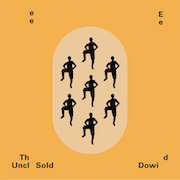The Uncle Sold is Ed Dowie’s debut solo release. Despite being described as ‘odd-pop’ by Lost Map Records, Dowie’s music feels at right at home in Johnny Lynch’s micro-label based in the Isle of Eigg, rooming with The Pictish Trail, Rozi Plain and others from a roster that once belonged to Fence Records.
From a musical life that began as chorister and organist in Dorset, Dowie’s pursuits took full flight in 1998 when he formed part of the Bournemouth-based trio Brothers in Sound (with Paul Hanford and Andy Guttridge). From there he travelled between Azerbaijan, Denmark and Spain, to North America and Leicester, studying experimental music and composing for puppetry/animated/film troupe The Paper Cinema.
For his first full-length recording, Dowie drew inspiration from Kazuo Ishiguro’s 1995 novel The Unconsoled. The malaproposistic title reveals a humour that buoys an otherwise sad and wistful album. Like Ishiguro’s book, The Uncle Sold is an explorative, dream-like journey through a nameless city, but Dowie’s efforts feel more personal and specific. Recorded in various studios around Dalston and Haringey, this album has a very real, urban anchor and the naming of places like Boston, Malabo, the MOTO, La Scala and Harlow implies a locus and centralised perspective from which the stories look outward. While Richard, Felicity, Hedrake, David, Albert and Pawel might be arbitrary aliases, you can’t help but believe that, because they have been named, their stories are true. Though unrelated, the narrative opens up to collectively form some kind of imaginary neighbourhood of dreams, disappointments, mundanities and absurdities. The Uncle Sold if nothing else is an astounding collection of poetry.
But this record is in fact, so much more than a lyric delight. Experience in the theatre and writing music to accompany the moving image makes Dowie’s debut a supremely confident musical and compositional effort. A meticulous understanding of drama and emotional manipulation, each track possesses a completeness of tone, timbre and melody.
‘Verbarhemiopia’ opens the album with a sublime contradiction; reverberating pulses, a rippling refrain and field recordings of fireworks hint at a vast sonic landscape while the intimate, guileless vocal line brings the listener in very close. Moving seamlessly to the second track, one of the stand-out songs on the album, ‘Red Or Grey’ begins with ghostly whispers of vocals and synthesiser. Ambling with a harp-like arpeggio, the vocals carry the song forward in choral layers creating a fulsome and resonant weave.
While you might not understand the meaning of Dowie’s puzzling lyrics, each song comes with its own symbol devised by his partner Felicity Hickson. Hailing from a career in film design, Hickson was responsible for the design and visual concept of The Uncle Sold, which Dowie says is "absolutely integral to the album as a whole," working towards the dream-like uncertainty and air of quixotic mystery that radiates from this record.
Another striking track, ‘Why Do You Live In France?’ with its Pink Floyd humour and unaffected vocal line plays out with self-assured simplicity alongside a lonely piano accompaniment. The album’s only other contributor, Katherine Mann’s (AKA Quinta) strings lace in and out of the gentle piano construction like a firefly and a treated melodica wheezes out a rustic solo as a foil to the melancholy of this beguiling track.
‘YungPawel’ and ‘May For A Dead Queen’ are the selected singles, and reinforce Dowie’s proficiency with a simple tool box of voice, keyboard and computer and his gift at creating a remarkable palette of synthesised textures and timbres that sound completely organic.
‘May For A Dead Queen’ begins with a mysterious clinking sound, created from the creak of a chair, and gingerly unfurls with a swimming vibraphone effect playing an uncomplicated melody that underpins Dowie’s naive and unafraid voice. Once again, a deceptive simplicity affirms the talent and ability of this accomplished, bold and starry-eyed visionary.


